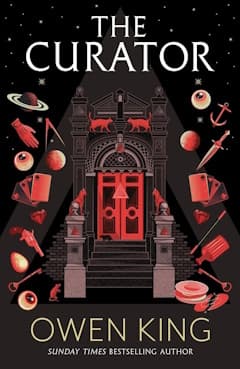
The Curator by Owen King
(Hodder & Stoughton, 2023)
Reviewed by Phil Nicholls
In his second novel, King has created a fascinating fable that rewards close reading. The Curator has an urban setting that feels like second-world fantasy, but is presented as a fictional city on an island off Europe. King playfully nods at genre conventions by insisting that the city cannot be mapped.
The whimsically unnamed city is a mix of Dickensian London and the setting of Gormenghast, yet London is specifically mentioned, so cannot be this city. In a sense, this could be any European city of the 19th century, with grand museums, factories, rotting docks and a crowded slum district.
At the opening of The Curator, the downtrodden common folk of the city have thrown out the corrupt aristocratic government. We follow the stories of several citizens as they try to survive the aftermath of the uprising, while the unlikely revolutionaries slowly build a new government. This background plot carried a strong sense of Animal Farm, as people struggle to cope with the clash between idealism and the reality of their new life.
King’s tone and descriptions of unusual elements in the setting only added to this parallel. Likewise, the sinister elements of the revolutionary forces reproduced the sense of impending doom that Orwell delivers on the farm.
The main thread of the plot revolves around Dora, a maid from the University who desperately wants to find out what her dead brother learned at the Society for Psykical Research. After the revolution, the building housing the Society is in ruins, so she becomes custodian of the nearby National Museum of the Worker. This museum is the centrepiece of King’s novel, featuring battered waxworks of assorted workers, along with cabinets of curiosities and a strange tendency to suddenly acquire new exhibits.
Surrounding Dora’s quest orbits a wide cast of characters, such as her lover, Robert, who is a lieutenant in the revolution. Yet, Robert seems to be playing at being a soldier, rather than an effective leader. Orphan thief Ike feels straight out of a Dickens’ novel; he befriends two street urchins who resemble extras from Oliver Twist. King weaves together a varied cast of well-drawn characters. Many take a turn providing a point of view on the fate of the city post-revolution, yet all the characters seem to intersect.
The eclectic nature of these minor characters, including a faded actress, a grumpy tram driver and the regulars at a seedy bar, all add to both the setting and the sense of whimsy King delivers. Woven into this mix are a popular religion focussed on cats, a whiff of stage magic and the suggestion of contact with other worlds. Yet, all these fantastical elements remain low-key, making the novel hard to classify.
This sense of toying with the tropes of fantasy without fully committing reminds me of Susanna Clarke’s Piranesi. King is also trying to straddle genre and mainstream fiction, I believe. As a fan of genre, I would have liked King to lean into these tropes a little more, instead of just teasing with hints.
Yet, The Curator is charming to read with engaging characters. King’s pacing matches genre expectations and so many of the characters are folded back into the story later. I sensed a puzzle at the heart of the book, one whose full connections evaded me. King delivers answers at the end, but I am not sure I understood all the clues and hints scattered through the text. Perhaps a second reading would help make clear the meaning of the extract from the play, how cats connect to the devil and quite what the magic box was showing Dora.
The Curator is a fast, clever novel with engaging characters and a lively prose style. Purists might feel the story is light on genre elements, but King uses his chosen tools with great style.
Review from BSFA Review 21 - Download your copy here.
